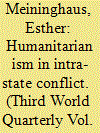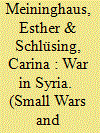| Srl | Item |
| 1 |
ID:
174333


|
|
|
|
|
| Summary/Abstract |
Stabilization is a contestable concept of intervention in violent conflicts. Often, it is either uncritically supported or rejected. In this article, we criticize current conceptualisations and practices of stabilization and newly introduce a dynamic approach for stabilization that yields a transformative potential. By distinguishing static vs. dynamic approaches to stabilization, we address the widespread dilemma that so-called stabilization measures seem unable to avoid instability and protracted violence in the long-term. Our analysis of the three policy fields peacekeeping, train & equip programmes and migration management in Mali reveals the dominance of static elements in stabilization practice. Instead, our article proposes to see a transformative variant of stabilization measures that enhances long-term security and development. We argue that there are two dynamic approaches of stabilization that policy-makers and practitioners can apply in (post-)conflict societies: state-centred liberal peacebuilding that takes its normative core seriously, and non-state centric peacebuilding that acknowledges alternative lived orders.
|
|
|
|
|
|
|
|
|
|
|
|
|
|
|
|
| 2 |
ID:
146661


|
|
|
|
|
| Summary/Abstract |
This article argues that humanitarian aid in intra-state conflict plays a crucial but largely unrecognised role in shaping the preconditions for negotiations for peace and post-conflict reconstruction. Drawing on a spatial theory approach, it identifies the role of humanitarian aid as not being temporary and independent, but as forming an integral part of the daily lives of local communities and of continuously evolving structures of governance during conflict. As a result, significant imbalances in the distribution of aid between different geographical areas, as highlighted in the current Syrian war, threaten not only the immediate survival of civilians, but also their future.
|
|
|
|
|
|
|
|
|
|
|
|
|
|
|
|
| 3 |
ID:
173842


|
|
|
|
|
| Summary/Abstract |
Current research on civil war neglects the effect of translocal ties on the mobilization of fighters in armed groups (AGs). Yet the Syrian war demonstrates the necessity to pay close attention to this twofold process: Analysing YPG, Hizballah and FSA networks, we argue that AGs are more likely to persist and avoid fragmentation in the long-term if they maintain strong linkages with local communities (local anchoring) and functioning linkages across different localities. We introduce here the concept of translocality to war studies, differentiating it from transnationalism. This analytical lens enables us to focus on localities within Syria, which can influence an actor’s power position in war decisively, while also being subjected to drastic change by AGs. We conclude that translocality offers insights for the study of civil war as it enables us to grasp the embedding of armed groups – or lack thereof – in local communities; differentiating between actor groups depending on their local anchoring, and observing network dynamics between different localities.
|
|
|
|
|
|
|
|
|
|
|
|
|
|
|
|